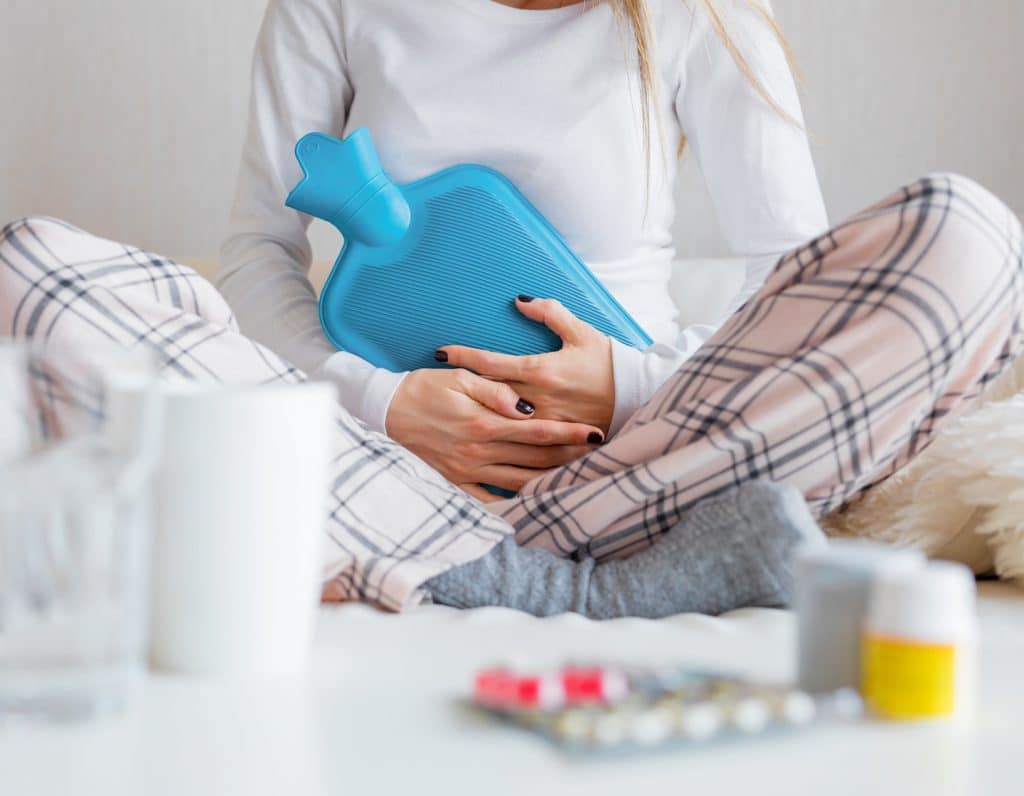

Women rock. Period.
Being a woman is a powerful thing and definitely something to be proud of! In recent years, ladies and their menstrual health has become front and centre in research, as we become more aware of what is going on with the intricacies of the female body. Along with the physical side of things, there is now a deeper understanding of how our brains and hormones affect more than just our mood. The health world has also realised how adding hormones to our bodies may be unsafe and lead to other health concerns.
Whether you’re familiar with your monthly cycle or could use some more advice, it’s always a good idea to get to grips with what’s going on down there – especially if something is a little funky that might need medical attention. So here’s the lowdown about menstrual history, your menstrual health and concerns that every woman should watch out for: endometriosis, bacterial vaginosis and polycystic ovary syndrome (PCOS).
Read more: Period Tracker Apps: Which Is Best For You?

The mystery and history of women’s bodies
Historically the female body was often seen by science in comparison to the male body. The belief was that the male body was normal and women were to be compared to them (ahem), in fact, for many years women were not even included in any scientific studies (such as drug trials) because they were seen as unreliable test subjects! Another fun fact, did you know that even the female oral birth control (OBC) pill was first tested on men? Crazy.
Thankfully, today we’re becoming more aware of how our brains function differently, not only from men’s, but also throughout our monthly cycle, so we can be aware of when we are more social, or when we function better at making choices, and also when we can be better problem solvers. Armed with this knowledge, women are being empowered by realising how periods can even improve the running of their businesses!
It’s my hope to inspire women to learn and understand even more about their body functions; especially menstrual health and ovulation. Let’s break the taboo around period talk. Talk about your body and all of its functions freely and without limits (#nomorelimits).
Tracking your mucus
To start, let’s look at mucus. In the area of the cervix, there are some pretty cool glands which release some very important cervical mucus which keeps your vagina healthy and clean. The amount and type of mucus is key in understanding your overall reproductive and menstrual health so make sure you get to know it, (well!). When your hormones are out of whack, these glands do not produce the right amounts of mucus so already you can have some indication of whether your hormones are out of balance.
Your cycle can let you know which hormones are out of sync. With practice and understanding, charting your cycle may reveal whether you have potential risks, perhaps an infection, or something more serious. By using a charting method (download a chart to get you started), you can also understand your fertile window – perfect for when trying to have (or avoid) a baby!

Menstrual health: Knowing when to seek help
I cannot stress enough the importance of knowing your mucus. Low mucus could indicate a problem and unusual discharge may be telling you there’s an imbalance in your body. Irregular hormones can cause a bacterial infection, a yeast infection, be a sign of an STD, endometriosis, PCOS, or even infertility.
Some will know their monthly cycle like the back of their hand, in which case you might already be one step ahead when realising that something is off. For example, severe menstrual pain is one thing that may be going on that is not “normal”. Generally, there may be some cramping and discomfort during your period because the act of expelling blood requires inflammatory signals in the body. Often you’ll end up with loose bowels around your period because of these signals to the pelvic area. However, there are menstrual health situations where women will experience symptoms that are not normal and will need attention:
- Endometriosis
- Polycystic ovary syndrome (PCOS) and irregular cycles
- Bacterial Vaginosis
Endometriosis
This illness can become a much bigger problem (causing infertility), yet it’s often missed. Many women might be told that their heavy or extremely painful periods are “normal”. But symptoms including severe abdominal pain, heavy bleeding during your period and irritable bowel syndrome could actually point towards endometriosis.
This illness happens when the uterus produces an excess of the endometrium (the lining of the uterus), during a period it sheds in an excessive amount and can cause “backwards bleeding” where the blood travels up through the fallopian tubes. This blood can even get into the stomach cavity or the peritoneum (the membrane forming the lining of the abdominal cavity). Sometimes, the endometrium becomes trapped and attaches to other body parts creating lesions that cause tremendous pain and discomfort for sufferers.
Treatment includes taking birth control pills to regulate the hormones thought to cause the issue, but it’s also thought that by making some dietary changes (such as reducing sugar and cutting out caffeine and alcohol) can reduce the symptoms.
Polycystic Ovary Syndrome (PCOS)
Every woman is different when it comes to menstrual cycles, they can range anywhere from 21 to 31 days and then some! You’ll come to know what is normal for you, but irregular cycles could be a sign of a deeper issue. Polycystic ovary syndrome PCOS (or the new name: metabolic reproductive syndrome) can create irregular cycles for example. This is caused by (you guessed it!) an imbalance in hormones. With PCOS, high luteinising hormone (LH) causes an increase in male hormones (androgens). These androgens lead to symptoms such as excess hair growth and acne, weight gain is often but not always a symptom. Cysts are also a common symptom because the LH affects ovulation (resulting in ovarian cysts), but are not always found with PCOS.
Insulin levels in the body may also be affected, with symptoms including blood sugar imbalances (resulting in fatigue, difficulty focusing, anxiety, hunger and cravings). Be sure to consider blood sugar when checking your hormones.
Bacterial Vaginosis (BV)
Common complaints from women are around unusual discharge. Many will believe it is a yeast infection, however, often it is BV instead. So what’s the difference? The vaginal microbiome requires a very delicate balance of healthy bacteria, but when this becomes disrupted it can result in BV. Thrush is a common infection caused by an overgrowth of Candida albicans yeast, but bacterial vaginosis is the result of an overgrowth of bacteria in the vulval area. This imbalance occurs when exposing your body to toxins and ways this can occur include:
- Douching your vagina with any products (just stop the douching!)
- Using perfumed soap products
- Wearing synthetic undies (or g-strings)
- Using damaging menstrual products/tampons (abrasive materials, toxic ingredients, left too long)
- Forgetting to wipe from front to back exposing your delicate flora to foreign bacteria
- Forgetting to use condoms with new partners
- Eating too many sugary products and processed foods
Ways to improve your vaginal health include considering a healthier lifestyle of foods, environmental choices and hygiene products.
![]()
![]()
If you notice any changes to your usual cycle (flow, pain, length of periods etc.), or perhaps one of the above menstrual health issues might sound familiar, your first port of call should always be your doctor for further investigation. Or you could book a free discovery call with Dr Katherine directly. But most importantly, trust your instincts. No one knows your body better than you do, so make sure to listen to what it’s trying to say.
Head over to the Menstrual Awareness Day in Central on Tuesday, 28 May, to find out more about your monthly flow and meet Dr Katherine in person.
Read more: It’s That Time Of The Month: Where To Get What You Need When You Need It!
 View All
View All











 View All
View All





 View All
View All


 View All
View All










